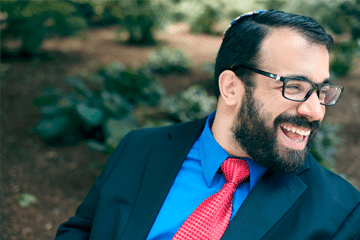 Before I left home and went off to college, my worldview was very different than it is now. A lack of diversity in both race and ability was no big deal – it was the norm. But now that I’ve been away from my hometown for eight years, I’ve come to understand that this flat worldview just isn’t reasonable.
Before I left home and went off to college, my worldview was very different than it is now. A lack of diversity in both race and ability was no big deal – it was the norm. But now that I’ve been away from my hometown for eight years, I’ve come to understand that this flat worldview just isn’t reasonable.
Renowned inclusion advocate Matan Koch is visiting the Mayerson JCC on May 6, and he often speaks about a concept of “universal inclusion.” Simply put, universal inclusion means that we not just accommodate those with unique needs when they arrive, but anticipate them and work to be ready before they ever come through the door.
“At its heart, universal inclusion creates a world where everyone’s talents and abilities can be accessed equally, and everyone can participate fully in life.” – Matan Koch
While universal inclusion benefits the recipient of its model, it also benefits everyone else. And here’s how:
1. Untapped potential
Who knows what someone can bring to the table? We’ve all heard of and cheered for underdog stories. But these stories come from somewhere – the individual who is living them. These people are more than their story – they don’t live just to inspire you. They have their own talent, abilities, hopes, and knowledge. When you listen to their ideas, and invite them to the conversation, it helps them be one step closer to realizing their full potential. And that potential is limitless.
2. Unique perspectives
Building off of previous statements, these individuals can bring unique perspectives. I don’t know what it feels like to live my life in a wheelchair. I don’t know what it feels like to have countless surgeries and doctor’s visits. Or to have people overlook me because I don’t look like them. I simply can’t relate. And that’s okay. But because I don’t have that worldview – because I don’t have those experiences, it is even more important that I listen to, acknowledge, and respect the unique perspectives of others.
3. Genuine connections
When you work to understand someone else’s perspective and life story, the connections with them are much deeper. Your respect for individuals that are different from yourself can be more sincere because you’ve learned stories that you never knew before. You can now connect a face to a cause, an issue, a type of advocacy, policy reform, and social justice causes. It changes you as a person when you directly know someone that has concerns that you’ve never had to consider. It triggers your empathy – and your humanity.
While these are only three reasons that inclusion matters, they shouldn’t be diminished. Having an inclusive environment for those that participate is paramount. Our world is becoming smaller by the day, and it’s important to reflect that in our organizations, businesses, and lives.
